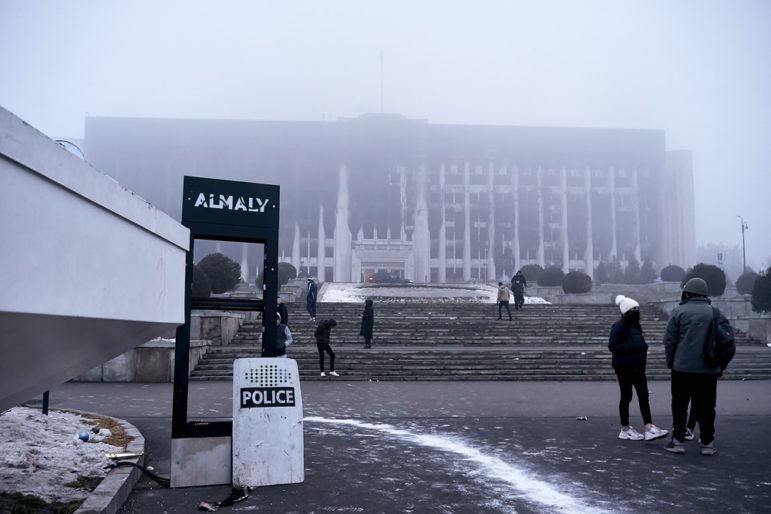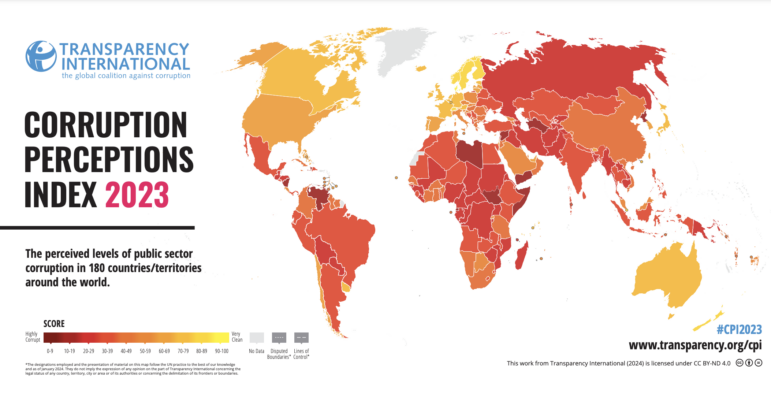

How a Journalist Got 80,000 Instagrammers Interested in Procurement in Kazakhstan

A government building in Almaty, Kazakhstan, after protests swept the country. The president branded protesters as “terrorist gangs,” while Human Rights Watch accused the government of shooting at demonstrators. Image: Shutterstock
Editor’s Note: We’re pleased to bring GIJN readers this story from the nonprofit Open Contracting Partnership on how one journalist’s Instagram campaign on public procurement corruption drew 80,000 followers and stopped US$500,000 in suspicious purchases. The story takes place in the former Soviet republic of Kazakhstan, the largest country in Central Asia. Resource rich, politically repressive, and notoriously corrupt, Kazakhstan is the size of Western Europe but with just 19 million people.
Journalist Jamilya Maricheva from Kazakhstan has always been fascinated with how officials spend public money. Almost two years ago, she decided to carry out an experiment. She created a serious page about public procurement and finances on Instagram, a platform usually associated with entertainment. She named the account ProTenge, after the national currency, the tenge.
At first glance, public procurement may not seem like the most Instagrammable subject. But what it lacks in visual appeal, it makes up for in scandal. If you visit the ProTenge account, you won’t find photos of mesmerizing landscapes or hip city life. But you can read about luxury yachts purchased with taxpayers’ money and vote on which mayor spends more funds on frivolous things.
Maricheva’s experiment proved a success. ProTenge has become an influential media source in Kazakhstan. Thanks to her reporting, her team has managed to stop suspicious procurement purchases worth US$500,000. The account has 80,000 followers, thousands of likes, and in-depth discussions in the comments section.
ProTenge has also attracted attention outside Kazakhstan. Maricheva was one of 12 anti-corruption champions from across the world recognized by the US State Department for their contribution to detecting and combating corruption (her name is sometimes anglicized as Jamiliya or Dzhamilya,) and the global organization World Commerce & Contracting highlighted her work as an example of female leadership in the procurement sector.
Since Kazakhstan was rocked by protests in January 2022, ProTenge’s mission has become more relevant than ever: to form a community of taxpayers who keep a close eye on how the government spends their money.
“We Live in a Rich Country, But We Are Not Rich.”
Maricheva started working as a journalist 18 years ago, for a local newspaper in Pavlodar, a city in the northeastern part of the country. At first, she covered everything from local politics to culture and housing and issues with public utilities. But she quickly realized her primary interest was “how corrupt officials fulfill their potential in creative ways.” Maricheva often attended the trials of people accused of corruption. The deliberations of the cases were often unsettling.
“In the trials of corrupt officials, there is no tangible victim, no specific person,” says Maricheva. “The government is the victim. And that makes it appear that the person didn’t do anything particularly terrible. No hit and run, no one was killed. Just millions stolen from the government. And no one cared that because of these actions, fewer medicines could be purchased, or less money was put into education. Now, we live in a rich country, but we are not rich. This is the result of the corruption that we treated so lightly.”
It was only decades later, thanks to journalists and public pressure, that corruption in Kazakhstan officially became a crime. People convicted of corruption used to be released on probation or were sentenced to one or two years in jail. Now a corruption sentence can last seven or as much as 15 years.
At the same time, Maricheva points out, the highest-ranking officials in the government remain untouchable: “There have been a lot of leaks – Panama Papers, Pandora Papers – about multi-million dollar assets of unknown origin of the former president’s family. But there hasn’t been a response in the country. Neither the Prosecutor General, nor the Parliament, acted. They pretended they weren’t hearing anything.”
In 2019, the country’s first president Nursultan Nazarbayev resigned after almost 30 years and his successor, Kassym-Jomart Tokayev, was elected president. But Nazarbayev retains the official title of “leader of the nation,” lifelong chairmanship of the Security Council of Kazakhstan, and huge political influence.
In 2019, Maricheva was working at Hola News, an independent Kazakhstani media outlet created by a very young team. They relied heavily on social media in their work.
She recalls how they made a project with a theater for the Hola News Instagram page and filmed a video where the actors read poems linked to the news of the day. These posts received an incredible response from the audience. Maricheva realized that people are ready to talk about serious things on Instagram.
“Back then, I felt that people were tired of things they saw on social media,” says Maricheva. “At this very unnerving time, when power in Kazakhstan passed from one person to another, society needed to see not just cooking advice and lifestyle blogs on social media, but also the reality they lived in.”
She soon left Hola News but still wanted to cover public spending. As there no longer was any media outlet in Kazakhstan where she wanted to work, she decided to start her own project where she could “marry” her two hobbies, analytical work with data and communication in social networks. This is how ProTenge emerged.
When Internews Kazakhstan launched a competition for small grants for content production, it was difficult to defend her idea. Most of the jury members did not understand how a media outlet could be launched on Instagram without a website. But Maricheva convinced them that it was possible. In March 2020, ProTenge published its first post.
Following the Money
Over Maricheva’s 18 years working in journalism, using public procurement data has fundamentally changed her work. She recalls a story from many years ago when an expensive renovation of a theater took place in her native town of Pavlodar. Even after costly repairs the dressing rooms had roofs so leaky it rained and snowed right through. Back then, it took a full week and a lot of nerves to find out who the contractor was and how much they were paid. Now, you can find out everything in just a few clicks, which makes journalists’ lives much easier. At the same time, Maricheva laments the fact that there is still no public data on officials’ asset declarations in Kazakhstan, which could help to point out unexplained wealth to law enforcement officers.
ProTenge uses three methods to extract the information for their publications from the public procurement system.
- A creative approach. You search the system for anything that occurs to you. This way, for instance, you can look up purchases of Apple gadgets. Maricheva says that local officials really like buying them at overblown prices. ProTenge also regularly monitors how the state purchases PR services from bloggers because they believe that taxpayers should not spend money on this.
- By testing a journalistic hypothesis. For instance, after parliamentary or municipal elections, Maricheva began to check the elected officials, whether they have a business, and whether it has won any public contracts.
- A quick scan of public spending by the biggest procuring entities. Maricheva regularly checks all spending by the government or the Office of the President. After all, the higher the body in the state hierarchy, the less they write about it in Kazakhstan.
“The district leaders will be imprisoned in our country, and all their money will be counted,” says Maricheva. “They will face anything except maybe execution. But as soon as it comes to the Presidential Administration or some ministerial positions, the fight against corruption breaks down. From time to time, a case is opened against someone, but in fact nothing systematically changes. Transparency should begin with the Presidential Administration. A city with a population of 300,000 people could live off its budget. And there are zero reports. We don’t see the details, we don’t see what they buy, from whom and for how much.”
But even with these restrictions, the ProTenge team managed to achieve impressive results — thanks to their publications, the government canceled questionable public purchases for more than US$500,000.
At the same time, says Maricheva, Kazakh officials often cancel the purchase a few hours after ProTenge publishes their post. Usually, they do so retroactively to avoid it being linked to ProTenge’s reporting. But sometimes, government agencies admit that they canceled the purchase precisely after ProTenge’s post.
ProTenge decided to dedicate the first episode of a video project called How Things Work in Kazakhstan to how a state-owned company under the Ministry of Social Protection is spending 27 million tenges (about US$60,000) on fitness. Overnight, after the post was published, the readers shared it over 3,000 times on Instagram. And the very next morning, the Ministry of Social Protection announced that it would cancel this tender, check all agencies and enterprises under its control for unreasonable spending, and issue a directive prohibiting such unreasonable purchases.
“That’s why feedback and audience engagement are so important to me: likes, reposts, comments. When you write about political issues, the more you can engage people, the more impact you will have,” says Maricheva.
An Investigative Outlet Existing Solely on Social Media
Currently, ProTenge is a media outlet with a team of nine people, its own video production and pages on Instagram, Telegram, and YouTube. And despite the outstanding growth and increasing impact of the project on Kazakh society, Maricheva is still not considering launching a website.
“We live in a time when people do not go to websites,” says Maricheva. “I also prefer to learn from historical experience. In our country, it is customary to block websites. In 2019, all nine online media outlets that covered protests were shut down in Kazakhstan. It’s unfortunate when an outlet puts so much effort into gaining the audience’s trust, and then they get blocked instantly. With social media, it is much more difficult — the government will have to block not one page but the whole Instagram platform.” During the January 2022 protests, the Internet was down in Kazakhstan for several days.
In addition, Maricheva consciously wants to avoid ProTenge gaining the status of a media outlet to avoid formalizing its relationship with the Ministry of Information.
“Because of this, we are often called just a page on social media, but I’m not offended, she explains. “We are a social media page working in line with traditional journalistic standards. And during all this time, we have not received a single serious complaint about our work, because we work with facts, with figures, and we do not count someone else’s money, but taxpayers’ money. Yes, we are sarcastic, but our sarcasm is rooted in numbers.”
Last year, the team launched ProTenge’s Instagram page in the Kazakh language. The Kazakh language prevails in Kazakhstan, but the two largest cities in the country are Russian-speaking, and it is here that the bulk of the project’s audience lives. Maricheva really wants the trend for tracking public spending to reach the Kazakh-speaking population, and now they are trying hard to find the right tone for this audience. The main objective here is to form the same active community of readers.
“Our community is the main asset of ProTenge,” shares Maricheva. “And for any such project, it is very important to build a community first. And then it will organically expand because people will invite their friends with the same interests. Before, I had to respond to all comments under ProTenge’s publications by myself, and now, our readers communicate among themselves and explain all details if somebody doesn’t understand something.”
The ProTenge team sees its big mission in making more and more residents of Kazakhstan aware of themselves as taxpayers. When a person realizes this, they have a completely different attitude to the way the government spends their money.
A year ago, Maricheva already saw the impact of their work. On 2 January, she published a post encouraging readers to start their year by studying the annual budget. She also announced a contest among those who would find three specific numbers in the national budget. You would imagine that the holiday season is hardly the best time to delve into public finances and read legal acts. But she received the first response in just four minutes. And they kept coming for three more days.
The protests in January 2022 were sparked by an increase in gas prices, corruption, and uneven distribution of wealth in the country. This turned into clashes between protesters and law enforcement officers, bringing in a military contingent and the death of 225 people, according to official figures. After the state of emergency in Kazakhstan was lifted, President Kassym-Jomart Tokayev outlined the points that led to public outrage, including wasteful spending of taxpayers’ money, corrupt and non-transparent public procurement, and personal enrichment of a narrow circle of top officials and entrepreneurs. Soon, both the first president, Nursultan Nazarbayev, and members of his family, who for many years occupied the most influential posts in the country, lost their positions.
As a window of opportunity is opening in Kazakhstan, for which the country had to pay a very high price, the role of civil society and independent media, like ProTenge, is more important than ever.
“My team and I have agreed that it is essential for us to maintain our constructive tone,” says Maricheva. “We have always tried to talk about problems and how they can be solved. Against the backdrop of chaos in the country, it would be wrong to succumb to its influence. We are not for the whites, not for the reds, we are there for the citizens of Kazakhstan. We remain ourselves.”
In the wake of this year’s protests alone, more than 10,000 new subscribers started following ProTenge. Maricheva hopes that they will be able to engage even more people in controlling government spending. The ProTenge project that started as an experiment by one journalist has turned into something much bigger: a community of people monitoring how public officials are spending their taxes.
This story was originally published by Open Contracting Partnership and is republished here with permission. You can find the original post here.
Additional Resources
The Teenage Investigative Reporters Taking on Corruption in Kyrgyzstan
They Won’t Back Down: Kazakhstan’s Feisty Newspaper
GIJN Resource Center: Sources on Corruption
 Yevhen Hrytsenko is the head of communications at Prozorro, the Ukrainian state-owned enterprise managing the country’s public procurement. As a contributing author for Open Contracting Partnership, he has covered anti-corruption reforms and civic initiatives for more transparent and fair procurement in Eastern Europe and Central Asia.
Yevhen Hrytsenko is the head of communications at Prozorro, the Ukrainian state-owned enterprise managing the country’s public procurement. As a contributing author for Open Contracting Partnership, he has covered anti-corruption reforms and civic initiatives for more transparent and fair procurement in Eastern Europe and Central Asia.











